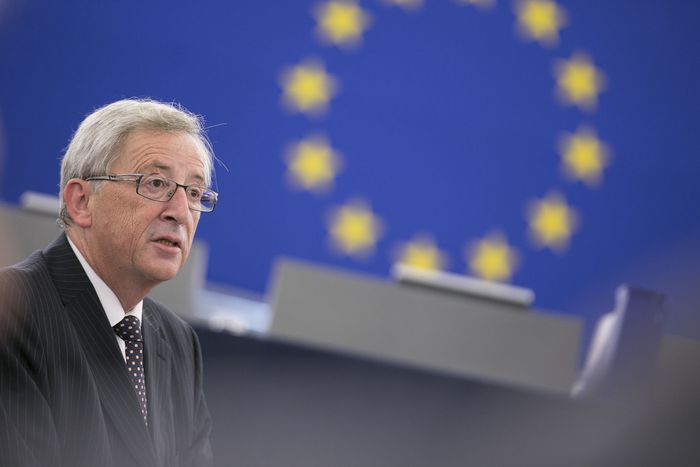
Does Juncker really give any importance to the young Europeans ?
Published on
Translation by:
 Viveka Anandane
Viveka Anandane
Two days ago, in front of the European Parliament, the president of the European Commission has briefly mentionned the situation of young europeans, affirming that he would not accept a "Europe where there is and there will remain young people's unemployment". But what about the EU's policies towards the young ? And what could we expect from the years to come ?
Wednesday the 14th of september, Jean-Claude Juncker, president of the european commission addressed the european parliament during the annual speech on the state of the European Union. Youth organizations were expecting a lot from this declaration, but it turned out to focus more on values and defense systems. To see a little more clearly on young people's politics, we interviewed Valentin Dupouey, general secretary of the JEF Europe (Young European Federalists), as well as Sarah Farndale, communication coordinator for the EYF (European Youth Forum).
cafébabel : What is your opinion on political decisions towards young europeans since the coming to office of Jean-Claude Juncker, in 2014?
Sarah Farndale : We see only very little action. A lot of promises have been made towards the young but we have not really seen concrete actions in this field. Especially when it comes to the involvement of youngsters in the debates about the future of Europe. We are not really integrated into politics.
Concerning the European Council which opens today in Bratislava, we called european leaders to really include the young within this debate and we hope that we will be heard.
cafébabel : What could you hope for from Jean-Claude Juncker's speech on policies for the young ?
Valentin Dupouey : What we could have expected, concerning the youth and education, is on the one hand that clear and strong engagements would be taken on european funds linked to the youth, especially on the Erasmus+ and on the Youth Guarantee, which has had trouble being implemented but of which we are recently starting to see the effects.
On the other hand, about the Stability and Growth Pact, which compels countries to follow a certain set of rules, we may have expected these rules to be more flexible on budgets linked to education and youth. But this is not the case.
cafébabel : Practically speaking, what was exactly said and what can we expect to happen ?
Valentin Dupouey : Jean-Claude Juncker has talked about the Youth Guarantee. He has had a very encouraging speech. In particular, he declared that he would not accept that "the millenials' generation, the Y generation, becomes for the first time in 70 years, poorer their parents' generation".
But in the end, fundings for the Youth Guarantee are going to be diminished through the Youth Employment Initiative. On the period over 2014-2016, six billion euros have been invested, and on the 2017-2020 period, this amount is expected to be of only two billions. Those six billion euros had been planned for the whole period, but have been entirely used during the first three years, instead of being properly dispatched. A little bit more of money is thus going to be added, which is after all a good news, but it is a lot less than what was initially agreed.
cafébabel : Are you disappointed ?
Valentin Dupouey : We are disappointed because there has been a huge difference between what was said, which sounded like progressist speeches, and what has been done. We were expecting declarations on volunteering. The president of the European Commission has made declarations on volunteering for the young in crisis types of situations (refugees, earthquake in Italy). But what he has suggested looks more like a spontaneous reaction rather than a long-term measure.
cafébabel : What are your suggestions in order to better the policy for the young in the European Union?
Sarah Farndale : We first think the young must be heard. It is important to give them space to voice their opinions during debates. Then, we think there should be a real investment in the youth, would it be in terms of job search but also more widely on education. We must ensure a real integration of the young into society.
___
Cet article a été rédigé par cafébabel Bruxelles. Toute appellation d'origine contrôlée.
Translated from Juncker s’adresse-t-il réellement à la jeunesse ?


